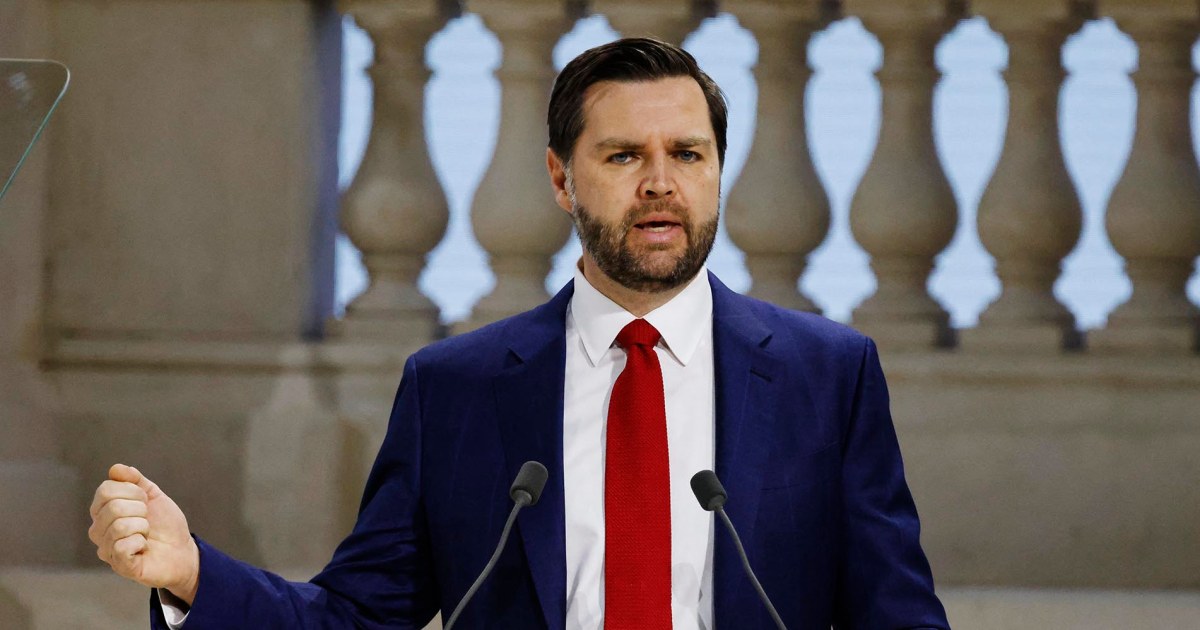PARIS — Vice President JD Vance warned European allies Tuesday that the White House would not accept international regulations on artificial intelligence if they held back U.S. ambitions to be the world’s dominant power in the revolutionary new technology.
“The United States of America is the leader in AI, and our administration plans to keep it that way,” Vance told an international AI summit in Paris. “We need international regulatory regimes that fosters the creation of AI technology rather than strangles it.”
In his first international speech since taking office, Vance said the U.S. was open to cooperating with other countries to harness AI. But he rejected the kind of tighter technology regulations seen in the European Union.
“The Trump administration is troubled by reports that some foreign governments are considering tightening the screws on U.S. tech companies with international footprints. Now America cannot and will not accept that.”
The Trump administration has made dominance in the field a priority, with the president on Jan. 21 announcing a joint venture to invest billions of dollars in AI infrastructure in the U.S. dubbed Stargate.
Vance also said that AI must remain free from what he called “ideological bias” and criticized E.U. efforts to create rules blocking harmful or misleading online content.
“We want to ensure the internet is a safe place, but it is one thing to prevent a predator from preying on a child on the internet, and it is something quite different to prevent a grown man or woman from accessing an opinion that the government thinks is misinformation,” he said.
Signs of the tensions between the U.S. and Europe on how to approach AI regulation emerged hours after Vance’s speech. The U.S. refused to join around 60 other countries in signing on to a French-led joint statement calling for an “inclusive and sustainable” approach to AI. The White House did not offer an immediate explanation for why it declined to sign on.
The global summit in Paris was attended by Chinese Vice Premier Zhang Guoqing and came weeks after the Chinese AI startup DeepSeek rattled markets by announcing it had created a sophisticated model at a fraction of the cost of those made in Silicon Valley.
Vance did not explicitly refer to China in his speech but said “authoritarian regimes have stolen and used AI to strengthen their military intelligence and surveillance capabilities.” He also warned European states not to partner with authoritarian states on AI development.
“Partnering with them means chaining your nation to an authoritarian master that seeks to infiltrate, dig in and seize your information infrastructure,” he said. In addition to the former Biden administration, the Trump administration has also pressured European countries to limit their exposure to Huawei, a Chinese telecom firm.
Speaking at the summit Monday, French President Emmanuel Macron said his country would simplify its technology rules but added that Europe would need to cooperate with both the U.S. and China.
Macron also said France’s nuclear power infrastructure made it a desirable location for AI development, because it could power energy-intensive data centers without relying on fossil fuels.
“I have a good friend on the other side of the ocean saying ‘Drill, baby, drill,’” Macron said, referring to President Donald Trump. “Here, there is no need to drill. It’s ‘Plug, baby, plug.’ Electricity is available.”
Anne Bouverot, Macron’s special envoy to the AI summit, told NBC News that the goal of the global gathering was not to begin work on an international framework for regulating AI.
“The summit is not to talk about rules and regulations. The summit is to find where are the areas, where there are coalitions of the willing to develop things, for example, common principles or goals for AI,” she said.
A number of U.S. technology executives attended the conference, including Google CEO Sundar Pichai and Open AI’s Sam Altman.
Reid Hoffman, the billionaire co-founder of LinkedIn, told NBC News that the U.S. should work closely with allies to make sure that democracies remained ahead of authoritarian nations in the development of AI.
“I think it’s very important that the Western democracies lead in this … so partnering with the Europeans, New Zealand, Australia, Japan, the Western democracy approach, I think, is very important. And I think that’s an important part of the global order.”

